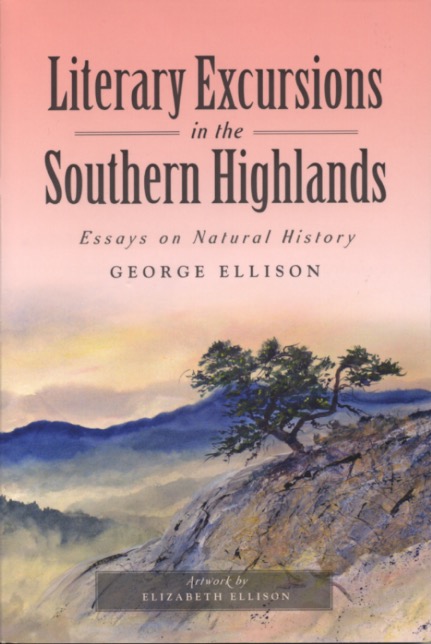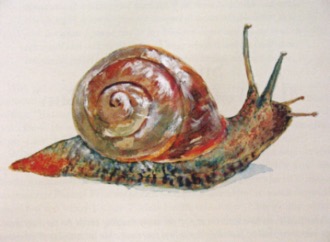Writer and naturalist George Ellison’s latest collection, Literary Excursions in the Southern Highlands: Essays on Natural History, is not a book you will finish in a single sitting. In fact, it’s a book you’ll put down many times. This isn’t indicative of Ellison’s abilities as a writer. Rather, it seems part of the collection’s design. In 50 essays, Ellison offers more than an overview of the various plants, animals, insects and landscapes of the Southern Blue Ridge. He quietly reminds us of the most rewarding, but often overlooked components of life: observation and deliberation. “For the most part,” Ellison writes, “we tend to take many astonishing things in our everyday world for granted.”
With that said, the writing certainly does offer plenty of insight and information about the natural world. From morning cloak butterflies to the Blue Ridge Mountains, nothing is too small or too big. Ellison’s descriptions are thoughtful, illuminating and precise. In one instance, a snail’s movement is compared to a “miniature sailboat, veering gracefully this way and that.”
In another essay, Ellison writes: “Acorns are elegant. They are one of our most attractive natural structures. You can’t help but admire the economy of form whereby a rough-textured cup (or cupule) is the enlarged and stiffened version of the small overlapping leaves that protected the female flower before it blossomed, while the smooth-textured nut is the enlarged ovary usually containing a single seed enclosed in a leathery protective shell.”
Throughout the collection, nature is intertwined with history, literature, philosophy and ancient tales. In “Redbird: Daughter of the Sun,” Ellison considers a world without songbirds (which, he deems, would be hell). Later in this same essay, the writer emphasizes our tendency towards complacency, reminding the reader to “pay attention to the commonplace.” In the second half of the piece, Ellison offers one of the book’s most memorable tales. Derived from James Mooney’s Myths of the Cherokees (1900), Ellison retells “The Daughter of the Sun: The Origins of Death,” a story of metamorphosis, broken promises and (as the title suggests) death. All of this, mind you, is written in two-and-a-half pages.
It is the compact nature of these works that keeps the reader from breezing through the book. It’s not overwhelming, but the amount of information and ideas certainly encourages readers to pause and consider each individual piece.
The collection also quietly advocates the benefits of humility. All of the writings originate from Ellison’s contributions to various publications over the years (Asheville Citizen-Times, Chinquapin: The Newsletter of the Southern Appalachian Botanical Society and Smoky Mountain News). These regular columns have created dialogue between Ellison and his readers. Of this, he writes: “One of the pleasures of writing and illustrating a weekly column about natural history is hearing from readers. Sometimes someone will write or call to take exception with what I’ve written. Not infrequently, they know a lot more than I do about a given topic, so I can learn something in the exchange if I pay attention.”
Once more, this emphasis on attention and the collection’s own attention to detail combine to offer a work that, on the surface, may seem an assembly of topics held together under the umbrella of nature. But at its core it’s something far more philosophical.
This could be another layer to the book as a whole: perhaps these distinctions are superfluous. “Literary Toads: From Shakespeare to Marianne Moore,” falls near the middle of the book. In it, Ellison looks to dispel the misinformation about the underappreciated toad. He considers them admirable creatures, writing on their usefulness in gardens: “The claim has been made that a single toad can do more for the welfare of your vegetables and other plants than any other creature, including the praying mantis or the lady bug.” Ellison further highlights the simple joy of watching a toad. Here is where the categories blend and where nature becomes philosophy. Ellison reminds the reader, “If you’re going to be a toad watcher, you’ve got to slow down. It’s not a fast-paced avocation. Chill out. Get yourself into a toadlike frame of mind.”
For more information on George Ellison visit georgeellison.com. For additional artwork by Elizabeth Ellison, visit elizabethellisongallery.com.




Before you comment
The comments section is here to provide a platform for civil dialogue on the issues we face together as a local community. Xpress is committed to offering this platform for all voices, but when the tone of the discussion gets nasty or strays off topic, we believe many people choose not to participate. Xpress editors are determined to moderate comments to ensure a constructive interchange is maintained. All comments judged not to be in keeping with the spirit of civil discourse will be removed and repeat violators will be banned. See here for our terms of service. Thank you for being part of this effort to promote respectful discussion.